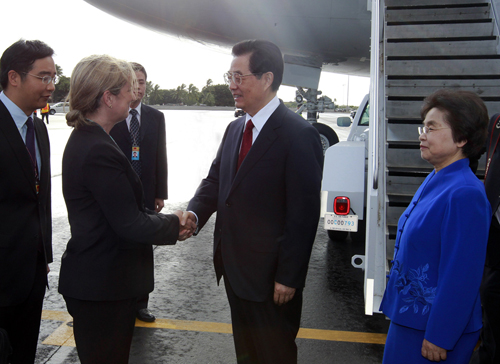Hu stresses Sino-US investment, IPR protection
 0 Comment(s)
0 Comment(s) Print
Print E-mail
China.org.cn, November 12, 2011
E-mail
China.org.cn, November 12, 2011
"The opportunities for expanding China-U.S. trade and economic links lie in the rapid growth of Chinese investment in the United States," said Chinese President Hu Jintao, adding that he supported companies from both countries in increasing mutual investment.
Hu made the remark after his arrival in Hawaii Thursday, meeting with a group of U.S. business leaders to exchange views on investment, trade and protection of intellectual property rights(IPR).
|
|
|
Chinese President Hu Jintao (R2) is received by a senior U.S. official upon his arrival in Honolulu, Hawaii for the Economic Leaders Meeting of the Asia-Pacific Economic Cooperation (APEC) on Thursday, November 10, 2011. [Xinhua]
|
"We positively perceive the U.S. government's manifestation that it welcomes Chinese companies to invest in the United States, and hope that the U.S. side would take more concrete action in this respect," Hu said.
Hu emphasized that deepening and expanding mutually beneficial trade and economic cooperation between China and the United States is in the interests of both peoples and conducive to the global economic recovery and development.
China-U.S. trade and economic relations are currently faced with both challenges and important opportunities, he said.
"The opportunities lie in economic restructuring in both China and the United States," Hu said.
According to the Chinese president, China is expected to import more than 8 trillion U.S. dollars worth of goods in the next five years.
By 2015, sales of consumer goods in China are likely to rise to nearly 5 trillion dollars, Hu said, adding that this will provide a huge market for the United States in its effort to rejuvenize the manufacturing industry and realize the goal of doubling U.S. exports.
Hu pointed out that opportunities for expanding China-U.S. trade and economic links also lie in the new growth areas of bilateral cooperation, including new energy, clean energy, energy efficiency, biopharmaceuticals, aviation, space and infrastructure construction.
"If the potential in these areas is tapped into, China-U.S. trade and economic cooperation will have boundless prospects," Hu said.
Closer cooperation at local levels also offers new opportunities for expanding bilateral economic links, he said, noting that over the past decade, 47 of the 50 U.S. states have witnessed a three-digit increase in exports to China.
"Growing at the current rate, China-U.S. trade volume will very likely exceed 500 billion dollars in the next three to four years," Hu said.
Hu emphasized that China stands firm in its determination to protect IPR, adding that since China has already had a fairly sophisticated legal system in that regard, the future focus would be law enforcement.
Hu said China has achieved positive results in its campaign to crack down on IPR infringement and counterfeits.
Noting that China will mark its 10th anniversary of joining the World Trade Organization (WTO) next month, Hu said openness in China's service trade sector has come close to the average level of developed countries.
He said China is determined to advance the reform and open-up cause, and will firmly adhere to the opening-up strategy of mutual benefit and win-win results, and will provide a sound investment environment for U.S. and other international companies as it always does.
Competition between Chinese and U.S. firms is a natural development of free trade and market economy, and virtuous and fair competition is good for the growth and common development of both Chinese and U.S. companies, he said.
He said the two sides should properly handle trade frictions through consultations based on an equal footing and in accordance with market rules and WTO regulations.
"The two sides should not politicalize trade and economic issues and should not pursue protectionism," Hu said.






